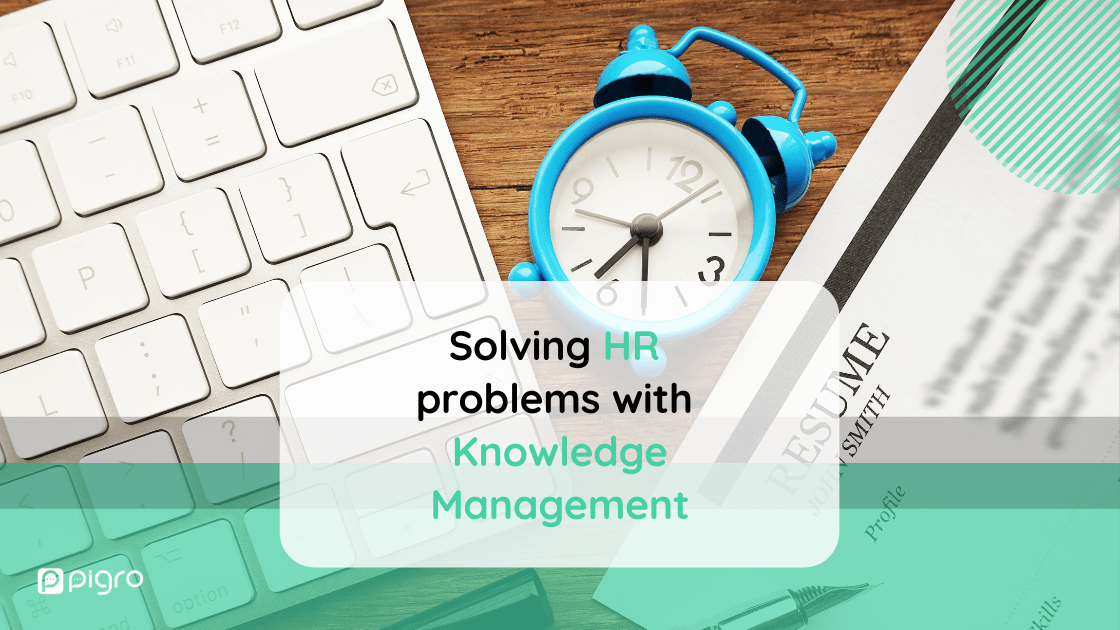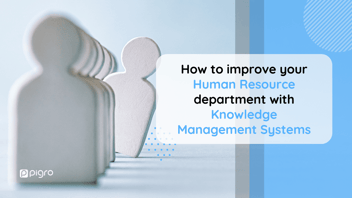The human resources department is responsible for managing human capital, which is "the knowledge, skills, competencies, and attributes embodied in individuals that facilitate the creation of personal, social and economic well-being" (OECD).
A Knowledge Management solution can be useful and functional to support those activities in every company department, HR included. If you are interested in learning more about the topic, you can contact one of our Pigro experts for free, otherwise, keep reading.
HR Knowledge management: characteristics
To make a company more innovative and efficient, it is necessary to implement the process of human resources managements through knowledge sharing.
For this process to be effective and provide valuable assistance to the company, it must have certain characteristics:
- facilitate access to knowledge, including "self-service," for anyone who needs it at any time, without lengthy in-person training sessions ;
- encourage collaboration, so that everyone can ask questions and receive answers;
- be easily updated with new information;
- be able to meet the specific needs of different teams and professionals;
- always be accessible in the long term, so that employees can search for the information they need.
The human resources department uses every day huge amounts of documentation, to carry out all the tasks from the recruitment process, to the onboarding of new employees, to the training process of human resources and management of personnel.
With a Knowledge Management System, it is possible to reduce the time spent each day searching through the company's knowledge base and devote more time to specific and more valuable tasks.
Let's see in practice, how a good knowledge management system can help the HR department in its daily management.
Good internal and external communication
To achieve effective communication, the company must provide managers and employees with the tools to implement it.
HR tasks rely on good communication, which is of two types:
-
internal to the company: between employees, who exchange information and work materials and collaborate on common projects;
-
external to the company: all phases, from recruitment to the creation of the company culture, involve sharing information with candidates, external organizations, and other companies.
In both cases, if the company's information is not organized and shared among staff members, this will affect the work of all divisions involved, which will have to spend time searching for the necessary material.
This situation can be avoided by knowledge sharing, i.e. the ability to share and access all information quickly and easily.
It is essential to have centralised access to the entire knowledge base, especially when it is scattered into several repositories. This way, it is not only possible to find the necessary material quickly, but also to detect possible gaps in the content.
If the documentation is chaotic one does not have full awareness of what is already present in it, risking wasting time in duplicating it. In the study "Workplace Knowledge and Productivity" it is estimated that every week about 6 hours/man are used to duplicate existing work and files. This is because in 70% of cases you can’t track down the person who did it before, or you don’t really know its existence.
Similarly, each employee loses 5 hours a week waiting to receive information, support or any other knowledge necessary to carry out their work.
On the other hand, if the required information does not exist, and there are therefore Knowledge Gaps, it is a good idea to understand the motivation and fill this gap before it creates delays.
Good communication inevitably involves sharing knowledge, which creates a climate of innovation and development that fosters collaboration and growth, both individually and organizationally.
Onboarding to avoid waste of resources
The onboarding phase is crucial for the integration of a new employee into the company: after the search phase (creation of the position and its advertisement, review of resumes, and interviews), the HR department is responsible for providing information about the company and the job description to the new employee.
Without this information, it will be impossible to have an overview of the job and therefore to make decisions about it independently.
However, this process is often not given the importance it deserves and the tools are not made available to the new employee, who remains tied to other colleagues, thus slowing down his or her own and others' work performance.
Once trained, staff must be autonomous in finding the information they need to do their job, and this is only possible with a good onboarding strategy based on knowledge management that allows them to quickly query the company's knowledge, receiving answers directly from existing documentation, without having to create new ones.
-jpg.jpeg?width=562&name=Solving-human-resources-problems-with-knowledge-management%20(3)-jpg.jpeg)
Always up-to-date information
In addition to quick access to information, it must always be up to date.
Relying on outdated documents will lead to staff performing their tasks poorly, often without realizing it.
If every time an employee looks at a document, they have to spend time checking that it is the latest version and that there is no newer, more up-to-date version, their work will be slowed down.
Here again, the knowledge management system can make a difference: it allows you to have content that is always updated automatically, without wasting the time of employees and managers who can continue to perform more value-added tasks.
Improving brand reputation
The work of human resources consists of many aspects, including the promotion and transmission of the corporate culture.
A strong corporate culture is based on policies and procedures that are shared by all.
However, if the guidelines are not clear to all departments or if each department adopts its version, the company will appear scattered and unstructured, both to employees and to the outside world.
This will hinder the sharing of information, which will be catalogued and classified in different ways, in addition to the risk of being redundant or, worse, creating conflicting information.
To overcome this problem, it is possible to optimise the company's knowledge so that it can be easily queried by knowledge management solutions, which can provide accurate and consistent answers, whether requested by the HR office or any other area.
How? Additional resources are not necessary to do so, thanks to Artificial Intelligence. In fact, today a feature called Knowledge Insights, developed by Pigro, is available to analyse and improve the company’s knowledge base. It measures the quality of the company’s content, by examining different KPIs, such as usability, accessibility, availability of updated versions, presence of knowledge gaps, etc. It then provides personalised insights to improve any deficiencies.
Indeed, knowledge-sharing allows everyone to be aligned and to be sure to work on up-to-date documentation, giving an organized and reliable company image.
Along with human capital, it is the pillar of the company, and only if a solid and shared structure is in place will it be possible to be effective and innovative.
Learn more on how to improve your HR department with a KM System.
Do you want to know more about Pigro and Knowledge Management? Contact us!



